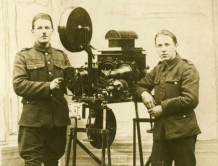Articles

Cinema on the Front Line
National prize for ground-breaking book on The First World War and Cinema
A ground-breaking film history book that was the first to analyse the connections between cinema and British soldiers during the First World War has been awarded a national literature prize.
Cinema on the Front Line – authored by Dr Chris Grosvenor – has been chosen by the Theatre Library Association as the recipient of its Richard Wall Memorial Award for exemplary work in the field of recorded performance.
Published by University of Exeter Press, Cinema on the Front Line: British Soldiers and Cinema in World War One is the first to document the wartime use of the visual medium to provide entertainment for the troops living through the trauma of the war. This included the setting up of makeshift theatres near the front line and for those convalescing in field hospitals and camps.
“My original inspiration for writing the book was coming across a photo from the First World War which featured British soldiers putting up a cinema screen and projector in the middle of a field,” said Dr Grosvenor. “My initial reaction was that this must have been a one-off novelty – but the more I looked into it, the more instances of ‘soldier cinemas’ I found. From there, I began the research that would originally form my PhD thesis and later the book itself, finding that the cinema and film culture was actually a huge part of the average British soldier’s experience during the war, and ranked alongside sport, music and theatre as one of their favourite pastimes when on ‘rest’ away from the trenches.”
Dr Grosvenor, a Lecturer in Film Studies, in the Faculty of Humanities, Arts and Social Sciences at Exeter, spent four years researching and writing the book, poring over war diaries and hand-written military records “caked in trench mud” for evidence.
Among his many findings were that film-viewing was so popular that troops would regularly pack into bombed out buildings near the front-line to watch the latest movies. Soldiers would volunteer as projectionists or be responsible for sourcing films from distribution companies in the UK, and there could be up to three screenings per day. Dr Grosvenor even found remarkable evidence that some prisoners of war ran their own cinemas from within camps, watching films with their captors and resisting attempts to screen German propaganda.
“For soldiers, the cinema was not a disposable or arbitrary way to spend their free time, but a much-needed psychological respite from the immediate dangers of trench warfare,” Dr Grosvenor said. “It was a cathartic, morale-boosting release from the ever-present aura of impending doom that permeated life on the front lines.”
Founded in 1937, the Theatre Library Association supports librarians and archivists affiliated with theatre, dance, performance studies, popular entertainment, motion picture and broadcasting collections. For more than half a century, it has honoured great accomplishments in performing arts research and scholarship with its annual book awards.
“I was completely amazed and overwhelmed to hear that I had won the prize,” added Dr Grosvenor. “To know that my first book has been received so well and that it has been awarded a prize which in the past has been awarded to many scholars and writers I deeply admire and respect – many of whom explicitly informed and influenced Cinema on the Front Line – is incredible.”
Date: 16 September 2022
